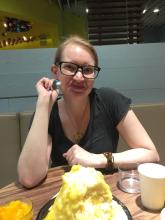You just returned from three years in China. Were you on a fellowship? Where did you study?
I had a Confucius China Studies fellowship for one year at Fudan University in Shanghai. I studied at their Journalism School, where graduates go on to be reporters, TV producers, or into many other media-related professions. I took classes on everything from new media and visual culture to documentary film. Prior to that, I did a yearlong intensive Mandarin course at IUP Tsinghua.
In China, you also worked extensively with the filmmaker Rong Guangrong. How was that experience? And what kind of work did you do?
I met Rong while I was studying Mandarin in Beijing. He ran an independent cinema space for documentaries that has since closed. I helped him apply for film festivals with his experimental documentary, Children Are Not Afraid of Death, Children Are Afraid of Ghosts, which won a prize at the Rotterdam International Film Festival. Since then, I have translated subtitles and materials for his new projects. I also helped him pitch his first mainstream narrative film at the Shanghai Film Festival’s financing competition this spring. And that gave me an up-close look at how young filmmakers get their work made.
Tell us about your dissertation.
The project focuses on contemporary nonfiction mainland Chinese film and media, beyond the New Documentary Movement. I am interested in how mainstream, popular media (such as reality TV) dealt with changes in documentary subjectivity and performance, particularly as it’s reflected in encounters between urban and rural spaces and people. The urban-rural divide, basically the fact that inequality, as a result of economic reforms, largely split along these lines, has been integral to changes in contemporary Chinese society, and its nonfiction representation shapes Chinese and international viewers’ understanding of the social fabric.
What are some of the more striking differences or connections between reality TV shows in China and in the US or elsewhere?
While it’s hard to speak in general terms, Chinese reality programs tend to be less intensely competitive (there’s nothing like Survivor), and South Korean formats are particularly influential at the moment. More specifically, I think Americans would be surprised at children’s participation in one of the programs I analyze called X-Change. It’s like Wife Swap but with rural and urban kids, who learn from living the other’s life for a short period, with kids as young as 9 participating without their parents. At the same time, since there is a general perception that Chinese media is heavily censored, some people would likely be surprised by how much China participates in global reality trends. The Voice is very popular, for example, and hip hop dancing shows were heavily promoted last fall.
In Winter 2019, you’ll be teaching an upper-division CMS course for the department. What are some of your plans for that class?
I am preparing a course on historical and contemporary experiences of new media through meta films. We will think about how viewers experienced film when it was new at the turn of the twentieth century and watch early films that depict this experience, like Uncle Josh at the Moving Picture Show (1902). We will also look at experiences of reality television (The Truman Show, 1998) and virtual reality (eXistenz, 1999), and analyze the films alongside theories of media and viewer experience.
